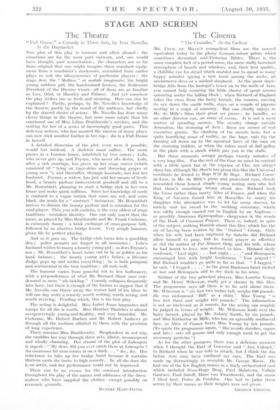STAGE AND SCREEN The Theatre
" Full House," a Comedy in Three Acts, by Ivor Novella. At the 1-laymarket
THE plot of this play is tenuous and often absurd ; the situations are for the most part outworn, and, one would have thought, past resuscitation ; the characters are so far froni original that one might imagine them standard equip- ment from a machinist's stockroom, assembled from earlier plays to suit the idiosyncrasies of particular players ; the stage Jew, the " Mollusc " or malade imaginaire, the bright young outdoor girl, the harebrained hostess, the frolicsome President of the Divorce Court—all of them are as familiar as Lux, Odol, or Huntley and Palmer. And yet somehow the play strikes one as fresh and amusing. How can this be explained ? Partly, perhaps, by Mr. Novello's knowledge of the theatre, partly by the mood of' the audience, but chiefly by the shrewd choice of actors. Mr. Novell° has done many clever things in the theatre, but none more astute than his continued use of Miss Lilian Braithwaite's services, and the writing for her of a series of increasingly good parts. This .delicious actress, who has assured the success of many plays, can now stick another feather in her cap : she is a Full House in herself.
A detailed dissection of the plot, even were it possible, would but mislead. A skeleton must suffice. The scene passes in a London house, inhabited by two sisters ; Lola, who never gets up, and Frynne, who never sits down. Lola, after a rich marriage, has given up her stage career (which consisted of " lying on tiger-skins and • throwing grapes at young men "), and thereafter, through lassitude, has lost her husband. Frynne, a widow, has just sold her means of liveli- hood, a beauty parlour (non-existent goodwill and all) to a Mr. Rosenblatt, planning to start a bridge club in her own house and make quick millions. Since her knowledge of cards is confined to a vague notion that some are red, and some black, she sends for a " contract " instructor. Mr. Rosenblatt arrives to discuss the beauty parlour and is mistaken for the card-player. This, you will exclaim, is the very oldest of stage traditions—mistaken identity. One can only assert that the scene, as played by Miss Braithwaite and Mr. Frank Cochrane, is extremely funny : a brisk exchange of cross-purpose talk, followed by an abortive bridge lesson. Very simple humour, given life by perfect playing.
And so it goes on. The bridge-chub turns into a gambling den ; police permits are forged in all innocence ; Lola's husband wishes to marry a hearty young girl ; so does Fryime's son ; Mr. Rosenblatt's heart turns out to be as golden as hiS bank balance ; the hearty .young girl's father, a Divorce Judge, pops up and settles everything ; he is both pompous and sentimental, in the true tradition ; all ends well.
The humour varies from graceful wit to low buffoonery, with a preponderance of what Mr. Bernard Shaw once con- demned as mere " rib-tickling." Comedy collapses frequently into farce, but there is enough of the former to suggest that if Mr. Novella can throw away the worser half of his ideas he will one day write a comedy worth writing, worth acting, and worth reviving. Pending which, this is his best play.
The acting is delightful. Miss Isabel Jeans languishes and vamps for all she is worth. Miss Heather Thatcher is almost overpoweringly young-and-healthy, and very beautiful. Mr. Cochrane, Mr. Hubert Harben and Mr.' Robert Andrews go through all the motions allotted to them with the precision of long experience.
There remains Miss Braithwaite. Resplendent in. red wig,
she muddles her way through three acts, idiotic, inconsequent and wholly charming. Her resume of the plot of Lohengrin is superb—" My dear, did you ever catch them at Lohengrin ? An enormous fat man comes in on a duck. . . " &c,, &c. Her reluctance to take up her bridge hand because it contains thirteen cards she turns to high comedy. In all she does she
is an artist, and her performance could not be improved. There can be no excuse for the constant introduction throughout the play of the names and addresses of the dress- makers who have supplied the clothes—except possibly on economic grounds.
RUPERT HART-DAVIS.


































 Previous page
Previous page